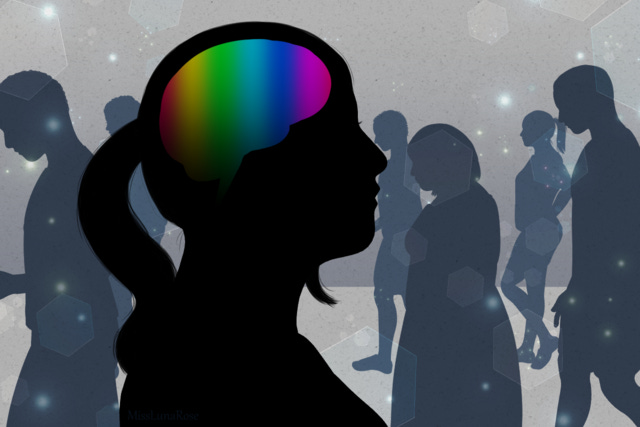
Discover more from Dave Clements
The cult of neurodiversity is making us sick
While those with genuine needs are ignored and much worse
It’s that time of year again - actually it’s that time of the night again (with less than an hour to go!) - when I realise, belatedly, that not only have I missed Autism Acceptance Month and World Autism Acceptance Week; but that I have also mislaid Neurodiversity Celebration Week. Perhaps I’m not aware enough. Maybe I need to go on awareness training. Or maybe I’m just not feeling very accepting or especially celebratory. Those of us with children ‘on the spectrum’ are more likely busy battling various institutional expressions - be it schools, local authorities, etc. - of the failure of society to give them the additional support they so desperately need.
Or perhaps we’re all, whether or not we’re personally affected, much more concerned about the horrors allegedly inflicted on children attending some special schools. Like the one a few hundred yards from where I am sitting right now that is the subject of a breaking BBC investigation. Or about the more everyday injustices faced by children with special educational needs or disabilities - like the boy with Downs Syndrome fortunate enough to have a none too accepting mother in the public eye, but unfortunate enough to be bounced out of a trampoline park. Not much to celebrate there either.
It seems to me that while a rather fashionable bunch of activists (and no doubt well-meaning folk too) are wearing their party hats for intellectual diversity, a large and growing minority of children and adults are being badly let down. The one’s that can’t talk or dress themselves. The one’s being excluded from school for having meltdowns. The one’s with learning or mental health needs who are being swept aside by what I can only describe as the culturally needy. You know the kind. The one’s that have never been diagnosed with anything and yet are vocally disabled or diverse in one way or another. Whether genuinely felt or cynically adopted, this is a problem.
The one’s who have never seen a professional about their condition and yet claim to be a ‘bit OCD’ or, increasingly, to have PDA, are exhibiting a sickness of sorts, I suppose. Pathological demand avoidance is a set of traits or behaviours typically associated with autism spectrum disorder (ASD). And yet of late, all it seems to take to be ‘a bit PDA’ - to self-diagnose away one’s willingness to endure the psychological discomforts of everyday life - is an averseness to the newly intolerable demands of the workplace. The growing numbers on disability benefits, including those making ADHD-related claims for Personal Independence Payments (PIP), are contributing to the unprecedented 9.25 million people neither working nor looking for work.
And, of course, this does nothing for those we are supposed to have some regard for. Worse than that, it encourages cynicism about those with genuine needs. Aren’t those kids struggling in school just bad or naughty kids, as some local councillors notoriously claimed earlier this year? Aren’t their parents just ‘swapping tips on how to get their children diagnosed’? Isn’t this whole business about neurodiversity just a con pushed by the woke and workshy? It can be genuinely confusing. It wouldn’t be unreasonable to answer yes to those questions, even though I know all too well that the opposite is also true. There are needs and there are the needy.
How else are we to make sense of the ‘avalanche’ in ASD and ADHD (Attention Deficit Hyperactivity Disorder) referrals, and the ‘diagnostic creep’ that has increased them five-fold? In particular, private practices are soaking up the pent up demand that the NHS can’t cope with and are, it is suggested, wildly overdiagnosing. Particularly ADHD, the subject of a newly launched task force that will look at provision, thresholds and the ‘powerful’ medication that many children are then prescribed. And yes, this is overdue a review. Getting to grips with the 'why' of all the referrals as well as the 'really?' of all the diagnoses is absolutely critical.
This latest ‘extraordinary, unpredicted and unprecedented’ ballooning of apparent need, says Thea Stein chief executive of the Nuffield Trust, has occurred in just four short years. Professor Simon Wessely, one of our most distinguished psychiatrists, has told NHS England that it is not a consequence of ‘better recognition or help seeking’ on the part of professionals, but rather a ‘re-evaluation of feelings, symptoms, emotions’. Or, as Work and Pensions Secretary Mel Stride has put it, it is an overreaction to the ‘normal anxieties of life’.
It's a complex issue but it tends to be discussed in black and white terms - either there's a lot of ADHD about or there's a lot of dubious self/mis-diagnosis. As the father of a boy with a joint diagnosis of ASD/ADHD, I have long had my own doubts and questions about the explosion in ADHD referrals and diagnoses. As do some of the professionals I speak with. But I also know, across the range of 'neurodiverse' conditions, that there is a lot of genuine unmet need out there and very little support for the individuals and families affected.
With over a million autistic people and over two million with ADHD in England, and an estimated 1.6 million children with disabilities (a twofold increase in the last decade), we’ve some explaining to do as a society. How do we distinguish the needs from the needy? Well, we need a proper open-ended discussion if we're going to work out what's going on - both at a clinical and a social/cultural level. Hopefully the review will be a start of that. In the meantime, and in the spirit of spreading real ‘awareness’, here are some communication tips from the National Autistic Society, for the autistic person in your life, office, etc.
Image: MissLunaRose12



